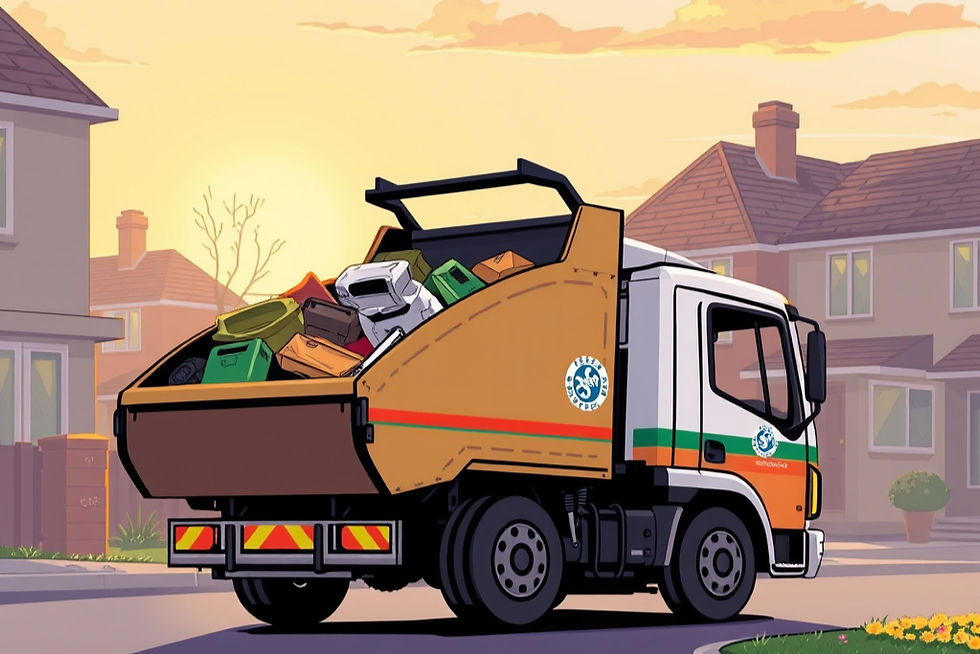From Trash to Truth: A Reflection on Our Habits
- Manoj Mittal

- Jun 2, 2025
- 5 min read
Updated: Jun 28, 2025

In our locality, every morning a vehicle collects garbage from each household. Some residents place it neatly outside their gates, while others keep it inside. During my morning walks, I've observed striking variations—some homes generate minimal waste, others have overflowing piles, and only a few take the time to segregate recyclables. This seemingly mundane routine makes me wonder: does the way we handle trash reveal something deeper about us? A frugal lifestyle might lead to less waste, an orderly mind to careful segregation, while convenience or indifference can result in careless disposal. Cultural values, personal habits, and even a sense of responsibility subtly shape this everyday act, turning garbage into an unexpected reflection of habits and character. Intrigued, I thought to dig deeper.
We do not usually think about our garbage. We bag it up, tie it tight, or put it in the waste bin and send it away—out of sight, out of mind. But what if I told you that our trash might be one of the clearest indicators of who we are? The contents of your garbage bin speak volumes. They offer clues not only about what you consume, but why you consume and how you consume. They whisper truths about what you value, what you waste, and how you live. And if we listen closely, our trash might tell us what kind of people we really are. Garbage is not glamorous. But it’s honest.
We curate our homes. We polish our resumes. We filter our photos. But we certainly do not edit our trash. What goes into the bin is raw, unfiltered evidence of daily life. And that is what makes it powerful. A person can talk endlessly about their values—sustainability, health, frugality—but if their trash tells a different story, which one is more believable? A household that claims to be environmentally conscious but throws out plastic bottles by the dozen every week or discards poly packs and polyethylene bags mixed with biodegradable waste every day? That is a gap between words and actions. A family that talks about healthy living but discards piles of fast-food wrappers? There is a disconnect. This is not about judgment. It is about awareness. Because when we ignore what we discard, we miss an opportunity to learn something vital about ourselves.
There is a story in the scraps. Let us take a closer look. Patterns emerge from any household's trash bin.
Packaging and Convenience: A bin with instant noodle wrappers and takeout containers suggests a fast-paced lifestyle, valuing convenience over nourishment or sustainability, possibly due to a busy family schedule.
Wasted Food: Rotting fruits and leftovers indicate poor meal planning, overconsumption, and a disconnection from resource value. In many cultures, like India, food waste is frowned upon as food is considered sacred.
Children’s Items: Toys and broken crayons reflect a home with children, creativity, and love. Frequent disposal of plastic toys suggests a pattern of consumption and disposability.
Medication and Health Products: Medicine boxes suggest chronic illness or aging struggles. Used syringes indicate illness and a careless attitude towards proper medical waste disposal.
Green Waste: Abundant vegetable peels and plant trimmings indicate a healthy lifestyle.
You do not need a detective to see what is happening in a home. Just look at what it throws away.
Recyclables: Segregating recyclables shows environmental consciousness and responsibility.
Electronic Waste: Discarded electronics indicate a tech-savvy household frequently upgrading gadgets.
Clothing and Textiles: Large amounts of discarded clothing suggest a tendency towards fast fashion and a disposable mindset.
On a larger scale, our collective garbage speaks to our culture. Visit the landfill near any urban city, and you will see the story of a society that lives in excess. In developed nations, people throw away perfectly good clothes, half-eaten meals, and functioning electronics. Contrast that with communities where scarcity forces reuse, repair, and resourcefulness. However, in developed nations, they generally have separate and different disposal systems for working electronics and other usable but discarded items. Our trash tells the story of abundance, but it also tells the story of carelessness or thoughtfulness.

Culture is not just built by what we create; it is also shaped by what we discard. A society that treats goods as disposable may also start treating relationships, traditions, or even time the same way, which is akin to a use-and-throw mindset mostly pervasive in western developed communities. We see this when people upgrade phones every year, not because they are broken, but because they want the latest model. We see it when we buy fast fashion that lasts only a few wears. You can make it out from trash. And we see it when we throw out the old—not just things, but sometimes even people—because they no longer serve us.
In leadership and in life, I have always believed that consistency is more powerful than intensity. And there is nothing more consistent than what ends up in our trash every day. Garbage reveals habits. It shows repetition. What gets thrown away over and over tells you where the loops are in someone’s life. The same processed snack wrappers every day? That is not a one-time indulgence. It is a pattern. Multiple empty wine bottles in the bin every week? That might point to a habit of trying to dull something deeper. Stacks of unused, unopened items? Perhaps a shopping addiction. Or maybe a coping mechanism.
The truth is most of our behavior runs on autopilot. And the bin does not lie. It logs our defaults. It exposes our loops. And when we begin to examine them, we can finally take ownership of them. Trash talks. But do we ever listen? We are so focused on acquisition—gaining knowledge, wealth, followers, success. But what if we learned just as much from what we let go of?
Imagine if, instead of avoiding our trash, we studied it. What would we change? How would we consume differently? What habits would we break? What values would we realign? Because trash is never just about waste. It is about intention. It is about whether we are living on purpose—or just floating through. Are we mindful of what comes into our homes? Do we pause before buying, using, and discarding? Or do we operate like machines—consume, discard, repeat? A leader who is self-aware is a better leader. A family that reflects on its waste becomes more intentional. A culture that listens to what its landfills are screaming might just find a better path forward.
So, what do we do with this knowledge? Start small. Start at home. Look in your trash, not with shame, but with curiosity. Ask questions-
What do we throw away most often?
What does this say about our habits?
Are our actions aligned with our values?
What can we reuse, reduce, or rethink?

Teach your children to see the value in every object. Not just its price tag, but the hands that made it, the resources it used, the earth it came from. If we can raise a generation that sees their trash as a mirror—not a blind spot—we will have taken a powerful step toward a more responsible future. Because in the end, character is not just about what we do in public. It is about what we do in private. It is about the choices we make when no one is watching. And yes—it is about what we throw away.
Trash is silent. It does not speak. It does not post on social media. It does not defend or explain itself. But maybe that is what makes it so honest. In the noise of our modern lives, where everyone is trying to be seen and heard, perhaps the most profound truths are sitting in silence—at the bottom of our trash bins. So, the next time you take out the garbage, look at it. Learn from it. Let it remind you of who you are—and more importantly—who you want to be. Because it is never just garbage. It is a reflection. And reflections, when we dare to face them, have the power to change everything.
Manoj Mittal – Noida | June 21, 2025

© This blog post is the intellectual property of MANOJ MITTAL. Unauthorized use or reproduction is prohibited.












Comments